The Vision of Salvation
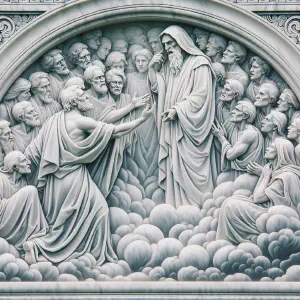
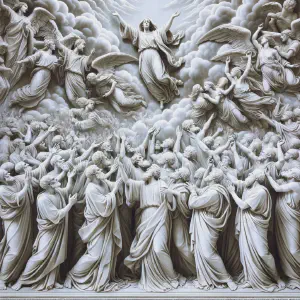
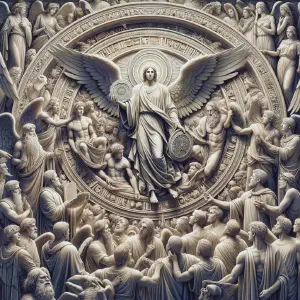
Surrounding them were angels, elders, and heavenly beings, all united in a chorus of worship, offering praises to God. Their words echoed through the heavens, affirming God’s eternal glory, wisdom, and might. Amidst this celestial gathering, an elder revealed to John the identity of those in white robes: survivors of great tribulation, cleansed by the sacrifice of the Lamb. Their robes, once stained by the trials of life, were now white as snow, symbolizing their purification and victory through Christ’s sacrifice. On earth, the psalmist echoed this heavenly vision, proclaiming the Lord’s dominion over all creation. Only the pure in heart, those who seek God with sincerity and righteousness, could truly ascend to His holy presence. This was the people who longed to see God’s face, promised blessings and salvation. In the second reading, John reminded the faithful of their divine filiation. As children of God, their true nature and destiny were yet to be fully revealed. In this hope, they were called to purity, reflecting God’s own holiness. The Gospel of Matthew recounted Jesus’ teachings, the Beatitudes, which offered a vision of blessedness contrary to worldly values. He spoke of the poor in spirit, the mournful, the meek, those who hunger for righteousness, the merciful, the pure in heart, peacemakers, and those persecuted for righteousness. Each, He assured, would find their reward in the Kingdom of Heaven. This narrative, spanning visions of heaven and teachings on earth, wove together a tapestry of hope, purity, and ultimate salvation. It reminded believers of their identity as God’s children and the blessedness of living in accordance with His will, with the promise of eternal reward.
Five Questions
What does the sealing of the 144,000 in the Book of Revelation symbolize in Christian theology?
The sealing of the 144,000 in Revelation represents God’s protection over His chosen people during times of tribulation. It signifies spiritual preservation and is often interpreted as a metaphor for being marked by God’s grace, ensuring their spiritual safety despite earthly trials.
How do the Beatitudes in Matthew 5 relate to the concept of spiritual blessedness?
The Beatitudes present a counterintuitive view of blessedness, contrasting worldly values. They emphasize virtues like meekness, mercy, and purity of heart, offering a deeper spiritual fulfillment rather than earthly rewards. These teachings of Jesus highlight the importance of inner spiritual qualities for achieving true happiness and divine favor.
In Psalm 24, there is a reference to ascending the mountain of the Lord. What does this signify in a spiritual context?
Ascending the mountain of the Lord in Psalm 24 symbolizes the journey towards spiritual enlightenment and closeness to God. It’s a metaphor for the soul’s ascent to holiness and divine truth. The psalm underscores the need for purity, righteousness, and sincerity in seeking a deeper relationship with God.
How does the First Letter of John describe our relationship with God and its impact on our identity?
The First Letter of John emphasizes that believers are children of God, a status that bestows on us a unique identity and destiny. This relationship transforms our understanding of ourselves and our place in the world, as it highlights our call to holiness and purity, reflecting God’s nature. It also points to a future revelation of our true selves in complete unity with God.
What is the significance of the multitude from every nation in white robes in Revelation, and how does this tie into the overall message of these scriptures?
The multitude in white robes from every nation in Revelation signifies the universal salvation offered through Jesus Christ. It represents people from all backgrounds united in faith, purified through the sacrifice of the Lamb. This imagery ties into the overall message of these scriptures by emphasizing God’s inclusive plan of salvation, the transformative power of faith, and the ultimate triumph of good over evil.
Bible Study
Revelation 7:2-4, 9-14
I, John, saw another angel come up from the East,
holding the seal of the living God.
He cried out in a loud voice to the four angels
who were given power to damage the land and the sea,
“Do not damage the land or the sea or the trees
until we put the seal on the foreheads of the servants of our God.”
I heard the number of those who had been marked with the seal,
one hundred and forty-four thousand marked
from every tribe of the children of Israel.
After this I had a vision of a great multitude,
which no one could count,
from every nation, race, people, and tongue.
They stood before the throne and before the Lamb,
wearing white robes and holding palm branches in their hands.
They cried out in a loud voice:
“Salvation comes from our God, who is seated on the throne,
and from the Lamb.”
All the angels stood around the throne
and around the elders and the four living creatures.
They prostrated themselves before the throne,
worshiped God, and exclaimed:
“Amen. Blessing and glory, wisdom and thanksgiving,
honor, power, and might
be to our God forever and ever. Amen.”
Then one of the elders spoke up and said to me,
“Who are these wearing white robes, and where did they come from?”
I said to him, “My lord, you are the one who knows.”
He said to me,
“These are the ones who have survived the time of great distress;
they have washed their robes
and made them white in the Blood of the Lamb.”
This passage from Revelation, written by John the Apostle, encapsulates Catholic themes of salvation, divine protection, and universal redemption. The sealing of the 144,000 from the tribes of Israel symbolizes God’s preservation of His faithful, aligning with the Church’s belief in divine grace and protection. The vision of the multitude from every nation in white robes reflects the Catholic understanding of the universal call to holiness and the Church’s inclusivity. The white robes, washed in the Blood of the Lamb, emphasize the salvific power of Christ’s sacrifice, a cornerstone of Catholic soteriology.
Psalm 24:1bc-2, 3-4ab, 5-6
The LORD’s are the earth and its fullness;
the world and those who dwell in it.
For he founded it upon the seas
and established it upon the rivers.
Who can ascend the mountain of the LORD?
or who may stand in his holy place?
One whose hands are sinless, whose heart is clean,
who desires not what is vain.
He shall receive a blessing from the LORD,
a reward from God his savior.
Such is the race that seeks him,
that seeks the face of the God of Jacob.
This Psalm reflects on the majesty of God as the Creator and establishes the prerequisites for communion with Him: purity of heart and a rejection of vanity. It aligns with Catholic teachings on the necessity of internal spiritual cleanliness and humility, as outlined in the Beatitudes. The quest to seek God’s face symbolizes the lifelong journey of faith and spiritual growth, resonating with the Catholic understanding of sanctification and the pursuit of divine grace.
1 John 3:1-3
Beloved:
See what love the Father has bestowed on us
that we may be called the children of God.
Yet so we are.
The reason the world does not know us
is that it did not know him.
Beloved, we are God’s children now;
what we shall be has not yet been revealed.
We do know that when it is revealed we shall be like him,
for we shall see him as he is.
Everyone who has this hope based on him makes himself pure,
as he is pure.
Authored by John the Apostle, this passage emphasizes the transformative love of God, which grants believers the status of God’s children. This aligns with the Catholic doctrine of divine filiation, the spiritual adoption into God’s family. The call to purity and the hope of being like God in the future resonate with Catholic teachings on sanctification and the ultimate goal of theosis, or becoming
partakers in the divine nature. It reflects Catholic values of hope, purity, and the transformative power of God’s grace.
Matthew 5:1-12a
When Jesus saw the crowds, he went up the mountain,
and after he had sat down, his disciples came to him.
He began to teach them, saying:
“Blessed are the poor in spirit,
for theirs is the kingdom of heaven.
Blessed are they who mourn,
for they will be comforted.
Blessed are the meek,
for they will inherit the land.
Blessed are they who hunger and thirst for righteousness,
for they will be satisfied.
Blessed are the merciful,
for they will be shown mercy.
Blessed are the clean of heart,
for they will see God.
Blessed are the peacemakers,
for they will be called children of God.
Blessed are they who are persecuted for the sake of righteousness,
for theirs is the kingdom of heaven.
Blessed are you when they insult you and persecute you
and utter every kind of evil against you falsely because of me.
Rejoice and be glad,
for your reward will be great in heaven.”
In this passage, Jesus Christ delivers the Beatitudes, a series of teachings central to Catholic moral theology. They emphasize virtues like humility, mercy, and peace, which align with the Catholic Church’s teachings on the path to holiness and living a Christ-like life. The Beatitudes invert worldly values, highlighting the kingdom of heaven as the ultimate reward, a concept deeply ingrained in Catholic eschatology and the pursuit of spiritual fulfillment over temporal success.
Lessons
The passages offer a profound reflection on God’s saving grace and the journey of faith. In Revelation, the sealing of the 144,000 and the vision of the countless multitude in white robes symbolize God’s protection and the purification through Christ’s sacrifice. The Psalm emphasizes the necessity of purity and sincerity in seeking God’s presence. 1 John reminds us of our identity as God’s children, a status that calls us to live in holiness, mirroring the purity of God. Finally, in the Beatitudes, Jesus outlines the attitudes and values that lead to true blessedness and eternal life. These teachings collectively inspire us to live in faith, strive for spiritual purity, and keep our hearts focused on the heavenly reward promised by our merciful and loving God.
Meditation Prayer
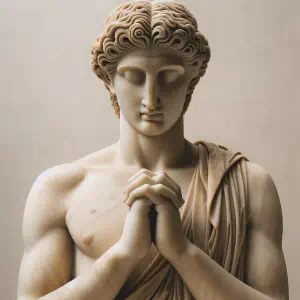
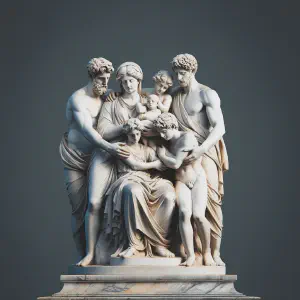
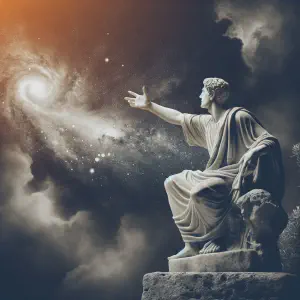
The Beatitudes, as taught by Your Son, Jesus Christ, illuminate the path to true happiness and fulfillment. They challenge us to embrace humility, mercy, and peace, virtues that not only enhance our emotional and mental well-being but also radiate to those around us. By living these teachings, we become beacons of Your light, spreading hope and joy in a world often shadowed by despair. Therefore, Lord, inspired by these readings, we commit ourselves to be Your faithful servants, to love without measure, and to seek Your wisdom in all our endeavors. May our lives be a testament to Your grace, as we strive to embody the virtues extolled in Your holy Word. Help us to be peacemakers, to show mercy, and to live with pure hearts, that we might see You in all things and share Your love with everyone we meet. In Your holy name, we pray. Amen.